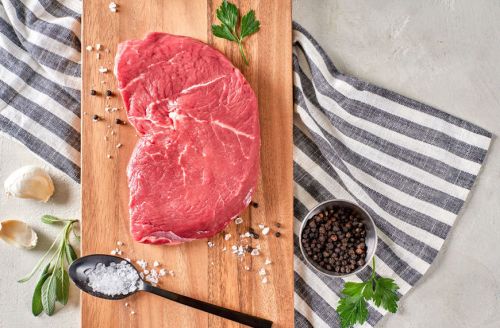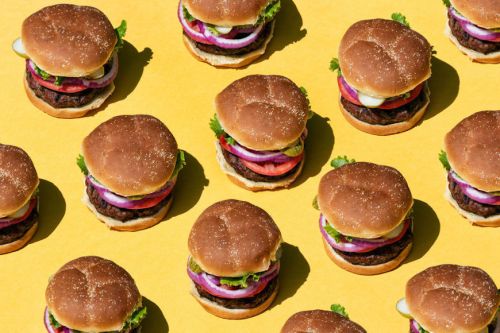How to make the healthiest, most ethical and sustainable food choices if you eat meat, dairy, and eggs
Consider this the ultimate guide to making healthy, humane, and sustainable food choices when consuming meat, dairy, and eggs.

The evidence is pretty overwhelming that one of the biggest things people can do for the environment (and their health) is cut back on animal foods. Beef production produces 13 times as many greenhouse gas emissions as vegetable proteins like beans and lentils, according to the Environmental Working Group. Two-thirds of all agricultural land is used for beef and dairy cows. Even eggs and milk create a greater carbon footprint than plant-based foods.
Yet many meat eaters argue that eating meat, when sourced ethically and sustainably, can be good for soil health and can help reverse the damage that big agriculture has done to the environment. Others say that it’s unrealistic to think everyone will give up animal products completely—even with all the amazing alternative options out there. And of course, meat is still a staple of many healthy eating plans, like Paleo and Whole30. Which begs the question: Is it possible to eat meat in a healthy, sustainable, ethical way?
“Not all meat is created equal when it comes to your health, the environment, or animal welfare,” says Kari Hamerschlag, the deputy director of the food and agriculture program of Friends of the Earth and a leading expert in animal agriculture, climate change, and farmer support. “There is a huge difference between purchasing meat that comes from animals raised in total confinement where there’s a lot of pollution to the environment [as well as] hormones and antibiotics, and [meat from animals] raised on the land in a way that really protects the soil and land.”
According to Hamerschlag, between 95 to 98 percent of all meat on the market in the US comes from factory farms, so it takes extra effort to find healthier, more ethical choices. But if you still want to eat meat, it’s worth the legwork. Here, Hamerschlag, registered dietitian Rachel Dickens, RD, and founders of meat, dairy, and egg brands going the extra mile all provide insight. Meat eaters, consider this your official guide.
Keep reading to see how to make the healthiest, most ethical, and sustainable options when consuming meat, dairy, and eggs.

Photo: Stocksy/Sean Locke
Meat
What a food advocate says: When it comes to buying meat, Hamerschlag says there are three labels to look for:
- USDA organic: “Organic means the animal was born and raised on certified organic pastures, so there are no chemicals in the grass or in the area that [the animal] was raised, and none of the feed was sprayed with [synthetic] pesticides, so you’re not getting as many pesticides when you eat the animal,” Hamerschlag explains.
- Grass-fed: Hamerschlag says this means that the animals ate grass as opposed to feed, which leads to a more nutrient-rich meat. “There’s also the Global Animal Partnership, which is a step process from 1 to 5 and a certification Whole Foods uses for all their meat,” Hamerschlag says. “You want to look for a step 4 or 5 because those steps mean the animals had access to pasture and were able to graze.”
- Certified Humane: The animals were treated ethically from birth to death, with regular access to food, water, and the outdoors and antibiotics only being used when the animal is sick. “Another label you’ll see sometimes that’s a good one is ‘Animal Welfare Approved,’ which means no hormones or antibiotics were ever used,” Hamerschlag says. (It should be noted that it’s illegal in the US for farmers to use growth hormones on pork or poultry, though it is legal for beef.)
Hamerschlag says Certified USDA Organic and American Grassfed Association labeling indicates important benefits for the environment, too. “Rather than using these harsh chemical [pesticides and fertilizers] that pollute the air, water, and soil, USDA organic farms use natural fertilizers and compost to grow healthy forage. They often but not always use sustainable practices such as crop rotation and cover crops to maintain soil fertility.” And meat that doesn’t use antibiotics “reduces the amount of antibiotics that get into our water supply through manure run-off. It also helps to reduce the potential for the growth of antibiotic-resistant bacteria which is a very big threat to sustainability of our world,” she says.
She adds that grass-fed animals, who wander freely and graze in farmland, also contribute to healthy plant growth, healthy soils, and healthy habitat for many beneficial wild critters — including bees and butterflies. “Animals provide natural pest and weed control, reducing the need for pesticides,” she adds.
Of course, buying organic, grass-fed, and Certified Humane meat can be expensive—one reason why Hamerschlag is a fan of either cutting back on meat consumption in favor of more plant-based proteins. She also recommends buying meat in bulk (say, a quarter of the animal) and freezing what you don’t eat right away to eat later. “Regardless of the type of meat consumers buy, we are eating too much, so if we truly want to be sustainable, we have to eat both less and better,” she says.
What a registered dietitian says: On the health front, Dickens agrees that organic, grass-fed is definitely the way to go. “Grass-fed meat is significantly higher in omega-3 fatty acids,” she says. “Grains [from feed] on the other hand, tend to be higher in omega-6 fatty acids.” While there’s nothing wrong with omega-6 acids per se, she says Western diets are higher in omega-6s than omega-3s, a ratio that can lead to inflammation. Her other big health call-out for meat is to look for antibiotic-free. “We’re seeing a lot of antibiotic resistance, so that’s something we really need to think about,” Dickens says.
Companies going above and beyond: When friends and chefs Chris Carter and James Peisker co-founded Porter Road—the first online, whole animal butcher shop—10 years ago, their mission was simple. They wanted to work directly with farmers they could trust, ensuring the animals were pasture-raised and free of antibiotics or hormones—ultimately leading to more nutrient-rich, better-tasting meat.
Carter and Peisker say that ten years ago, it was hard for them to find farmers who could meet their standards, but now farmers are coming to them, partially because they see how animals roaming the land has contributed to richer soil. That’s why working with meat suppliers who practice regenerative agriculture is a pillar of Porter Road’s mission. Peisker explains that regenerative agriculture—which prioritizes animal and plant farming that brings more oxygen into the soil and increases biodiversity—leads to better soil and plant health, which the animals feed on, and therefore leads to healthier animal products, too.
The company also cuts back on waste by selling the whole animal—even making new cuts that people otherwise wouldn’t know to use. “A lot of the cuts have way more flavor and are sometimes more tender and it’s a more fun shopping experience to be able to shop for the whole animal,” Peisker says.
Teton Waters Ranch is another meat company with organic farming, 100-percent grass-fed animals, humane welfare, and regenerative farming as their company’s tentpoles. “Our mission evolves around supporting a disruptive, anti-status quo supply chain for beef,” CEO Mike Murray says.
Like the Porter Road founders, Murray is passionate about regenerative farming. “Our founder Jeff Russell saw how adding animals was turning the land into vibrant grassland again,” he says. “It was basically dead, multi-generational potato farm when he acquired it [in 2006].” It took two years for Russell to rehabilitate the soil by planting local seeds, building bird houses to encourage local wildlife and seed spreading, and building a greenhouse for shrubs and trees. “Just as the native grasses started to come back, wildlife, like native birds, returned and the land was regaining fertility, the housing market crashed,” Murray says. So Russell bought cattle to continue rehabilitating the land and committed to raising them 100-percent grass-fed.
Of course, the meat company still recognizes that Americans are eating too much red meat (for their health and for the environment). That’s why they launched patties earlier this year that are half meat, half mushroom, a solution they found offers more nutrient density without compromising taste or texture.
Other brands in the meat space with organic, grass-fed, and Certified Humane practices in place include Verde, Ayrshire Farm, and Bently Ranch.

Photo: Stocksy/Audrey Shtecinjo
Dairy
What a food advocate says: According to Hamerschlag, all the same labels to look for for meat—organic, grass-fed, and Certified Humane—apply to dairy, too. “Farms can be organic without actually allowing the animals to roam around and eat grass, which is why you want to look for grass-fed, too; it means the animals had at least some access to pasture,” Hamerschlag says.
While much is said about the need to reduce meat consumption, Hamerschlag says it’s important to be conscious of dairy—specifically cheese—consumption, too. “Cheese has a huge carbon footprint. It takes ten pounds of milk to make one pound of cheese,” she says. Since some nut-based vegan cheeses and alt-milks have their own sustainability problems, such as requiring a lot of water to produce, a solution may be eating better quality cheese and milk less frequently.
What an RD says: Just like with meat, Dickens says organic, grass-fed milk, cheese, and yogurt is going to be the most nutrient-rich choice because it will be higher in omega 3s and lower in omega 6. “The same requirements apply to dairy when it comes to making the healthiest choices,” she says.
Companies going above and beyond: Organic Valley, which sells both dairy and eggs, has been vocal about the importance of keeping synthetic chemicals out of our food system. “Since we don’t use GMOs or synthetic chemical pesticides, we have kept over 355 million pounds of synthetic chemicals from being spread on farms and fields in the US,” says Leslie Kruempel, the brand’s mission executive. (And that’s a huge issue; certain weed-killers like dicamba can travel to neighboring farms and damage crops.)
While the company is not Certified Humane, Kruempel says they work with small and medium-sized family owned farms, all of which are committed to ethical animal practices. “The average size of milking herds in our co-op is 74 cows, which allows our farmers to interact more with each of his or her animals,” she says. “On the farms of Organic Valley, cows are out on pasture an average of 191 days a year—well above the organic requirement of 120 days. That means cows that make Organic Valley milk get a chance to enjoy the sun and munch on organic pastures. It also means that their diet is varied and doesn’t just consist of buckets of grain,” she adds. The company is also working toward making their facilities 100-percent renewably powered.
Brands that are organic and Certified Humane include Green Valley Organics, Organic Pastures, and Redwood Hill Creamery.

Photo: Stocksy/Audrey Shtecinjo
Eggs
What a food advocate says: Eggs can be confusing to buy as there are so many terms slapped on the label—many of which mean absolutely nothing, Hammerschlag says. One biggie: cage-free. “Cage-free simply means the animals aren’t in cages, but cage-free eggs often come from industrial farms that raise hens in crowded conditions with no outdoor access,” she says. Free-range, Hamerschlag says, may be better, but it’s not a regulated term.
What does carry weight? Organic and pasture-raised—ensuring the hens got to roam around outside. “When I see those terms on the carton, I’m happy,” Hamerschlag says. She also looks for the Certified Humane label to ensure the hens were treated well and free of antibiotics.
“Pasture-raised eggs will be better for the environment since cage-free eggs come from hens that are raised in very tight and crowded spaces, and the manure created from the animals can often pollute the surrounding air, water and soils,” Hamerschlag adds. Pasture-raised hens, however, have more space to roam, so their manure doesn’t pollute a concentrated space but rather acts as a natural fertilizer for the soil.
What an RD says: Once again, Dickens says organic, pasture-raised eggs are going to ensure you’re getting as many omega-3s as you can. “Also, when you compare free-range or pasture-raised eggs with conventional eggs, you’ll see that they are much higher in vitamin A,” she adds. The only other term Dickens says to consider with eggs is “omega-3 enriched eggs.” “Most people don’t need to get that, but if you are particularly worried about your omega-3 intake,”—say if you’re a vegetarian or don’t eat fish—”it’s one way to get more,” she says.
Companies going above and beyond: “Twelve years ago, our founder brought pasture-raised standards over from Europe, starting with one farm,” says Kathryn McKeon, director of marketing at Vital Farms. “He cared primarily about two things: how the hens were treated and what they ate,” she says, adding that each hen gets at least 108 square feet and plenty of fresh air and sunshine. All 200 farms Vital Farms works with avoid using herbicides or pesticides and McKeon says they pay all the farmers they work with above the national average for their wares. Now, their eggs are available in thousands of stores in the US.
Happy Egg Co. is another brand prioritizing both animal welfare and nutrient density (they sell both organic and non-organic eggs). While the “free-range” term didn’t mean much to Hamerschlag, Happy Egg president Dan Arnsperger says it sets a standard for them above and beyond conventional farms. (It’s worth noting that the brand is the first free-range egg producer to be American Humane Association certified.)
“Our farms have over eight acres of pasture and forest for our hens to enjoy every day, letting them forage, perch, dust bathe, stretch their wings, and exercise freely,” he says. “Happy Egg barns are lined with dozens of six-foot-wide openings—called ‘pop holes’—which make it easy for our hens to come and go. And we provide covered, state-of-the-art watering drip systems out on the range, so hens venture further, keep hydrated, yet stay safe.”
Egg brands that are organic and certified humane include: Happy Belly Cage-Free Eggs and Nellie’s Free Range Eggs. Pasture-raised eggs include: Blue Sky Family Farms, Carol’s Eggs, Handsome Brook Farm, Nest-Free Eggs, and Whole Foods’ 365 eggs.
While you’re considering your food habits, here are common grocery shopping mistakes even healthy eaters make. And here’s how to read a nutrition label.
Sign Up for Our Daily Newsletter
Get all the latest in wellness, trends, food, fitness, beauty, and more delivered right to your inbox.
Got it, you've been added to our email list.










